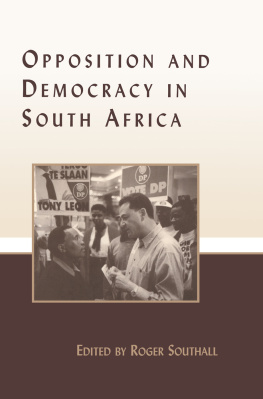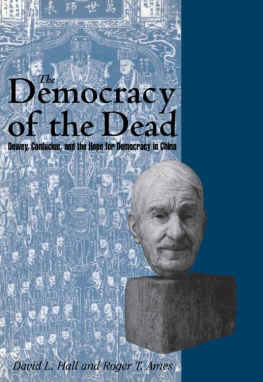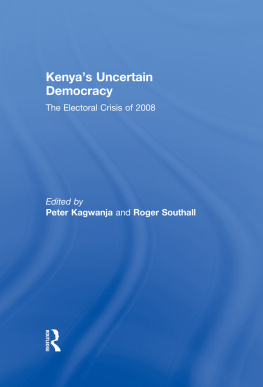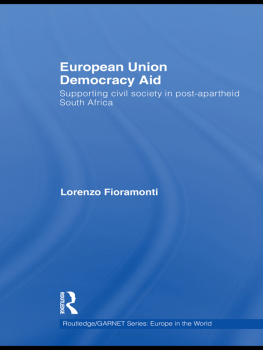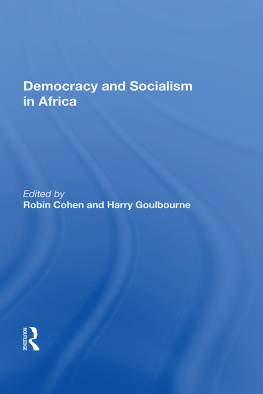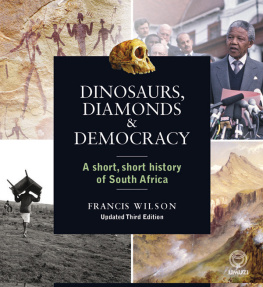OPPOSITION AND DEMOCRACY IN SOUTH AFRICA
BOOKS OF RELATED INTEREST
The Resilience of Democracy: Persistent Practice, Durable Idea
edited by Peter Burnell and Peter Calvert
Democracy Assistance: International Co-operation for Democratization
edited by Peter Burnell
Civil Society: Democratic Perspectives
edited by Robert Fine and Shirin Rai
Democracy and North America
edited by Alan Ware
The Internet, Democracy and Democratization
edited by Peter Ferdinand
Democratization and the Media
edited by Vicky Randall
OPPOSITION AND DEMOCRACY IN SOUTH AFRICA
edited by
ROGER SOUTHALL
Rhodes University
First Published in 2001 by
FRANK CASS PUBLISHERS
This edition published 2013 by Routledge
2 Park Square, Milton Park, Abingdon, Oxon OX14 4RN
711 Third Avenue, New York, NY 10017
Copyright 2001 Frank Cass Publishers
Routledge is an imprint of the Taylor & Francis Group, an informa business
British Library Cataloguing in Publication Data
Opposition and democracy in South Africa.
(Democratization studies)
1. Democracy South Africa 2. South Africa Politics and
government 1994
I. Southall, Roger J. II. Democratization
323.80968
ISBN 0-7146-5149-4 (cloth)
ISBN 0-7146-8173-3 (paper)
[ISSN 1465-4601]
Library of Congress Cataloging-in-Publication Data
Opposition and democracy in South Africa / edited by Roger Southall.
p. cm. (Democratization studies, ISSN 1465-4601)
First appeared in Democratization, vol. 8/1, spring 2001.
Includes bibliographical references and index.
ISBN 0-7146-5149-4 (cloth) ISBN 0-7146-8173-3 (pbk.)
1. Democracy South Africa. 2. South Africa Politics and government 1994 I.
Southall, Roger. II. Democratization. Vol. 8, no. 1 (spring 2001) III. Series
JQ1931.066 2001
320.968 dc21
2001028242
This group of studies first appeared in a Special Issue on
Opposition and Democracy in South Africa of Democratization
(ISSN 1351-0347) 8/1 (Spring 2001)
published by Frank Cass.
All rights reserved. No part of this publication may be reproduced, stored in or introduced into a retrieval system, or transmitted, in any form, or by any means, electronic, mechanical, photocopying, recording, or otherwise, without the prior written permission of the publisher of this book.
Contents
Roger Southall
David Pottie
Lia Nijzink
Louise Vincent
Gerhard Mar
Paul Maylam
Hennie Kotz
Robert Schrire
Ivor Sarakinsky
Hermann Giliomee, James Myburgh and Lawrence Schlemmer
Dale T. McKinley
Adam Habib and Rupert Taylor
Eddy Maloka
Janet Cherry
Eddie Webster
Roger Southall
ROGER SOUTHALL
South Africas first universal suffrage election in 1994 was widely hailed as a miracle marking a transition from colonial-racial dictatorship to a condition of non-racial democracy elaborated around one of the most liberal-democratic constitutions in the world. More recently, this perspective has been sustained by the successful conduct of a second popular election in 1999, which in the judgement of its foremost student indicates that South Africa has travelled quite far along the road to democratic consolidation.1 None the less, given the desperate legacy of apartheid and the brevity of South Africas democratic experience, it is not surprising that this optimistic viewpoint is generally tempered by quite a number of considerations. Lodge himself qualifies his assessment by observing that South Africa is challenged by the prevalence of alarming social inequalities and by the continuing weakness of the structural correlates of democratic endurance. Moreover it is only too well known that democracy in South Africa may yet be blighted by a horrific crime rate, corruption, economic stagnation and regional mayhem as well as by a host of other socio-economic deficits. Yet increasingly the debate is not just about whether democracy in South Africa will survive, but about the quality of that democracy.2
The particular aspect of the debate with which this collection is concerned is that of the role, functions, legitimacy and capacity of political opposition, about which there is presently very considerable argumentation. The debate starts from the fact of the current overwhelming political dominance of the ruling African National Congress (ANC) and the fragmentation of the opposition, which, with the assistance of the party-list system of proportional representation is split between some 12 different parties which are currently represented in the National Assembly (see Table 1).
TABLE 1
NATIONAL ELECTION RESULTS, 1994 AND 1999

Divided along grounds of history, ideology, aspiration, orientation, race and ethnicity, as well as by more immediate competition for electoral advantage, the parties of opposition are generally conceived to be struggling around major questions of tactics and strategy. How should they best oppose? Should they work singly, or in combination? If the latter, in informal alliance or formal coalition? And is their best option to engage in constructive opposition or should they be robust? And as the parties themselves struggle with these dilemmas, commentators regularly suggest that the opposition as a whole faces an existential crisis wherein some parties will die and others decline as only the fittest survive and prosper. Meanwhile, a common refrain, emanating especially from the Democratic Party (DP) (which, following the 1999 election was elevated to the status of being the Official Opposition), is that in its bid to establish its political hegemony, the ANC has embarked upon a deliberate project of defining robust opposition as illegitimate. The charge is that the ANC is engaged in marginalizing and taming opposition in order to shore up its monopoly of power. Not surprisingly, therefore, there are those who argue that the best hope for rendering the government accountable to the electorate is if opposition effectively becomes internalized. That means the constituencies within the Tripartite Alliance (of the ANC, South African Communist Party SACP and Congress of South African Trade Unions COSATU) keeping alive the flame of criticism from within.3
An immediate answer to one of these dilemmas was given by the DP and the New National Party (NNP) in June 2000 when they announced their formation of a Democratic Alliance (DA). This represents a transitional step towards a comprehensive merger which has come about largely on the DPs terms, not least because the NNP had proved so inept in adapting to the rigours and narrowed rewards of opposition after over 40 years in power since 1948.4 However, whilst much of the current debate is understandably absorbed by the shapes of and prospects for opposition in South Africa, it is rather more importantly engaged with what can be termed the issue of necessity. That issue is the extent to which opposition is an integral component of democracy, and how its survival and health can contribute to democratic consolidation.
This point can be developed by reference to two quotations from the Mail & Guardian



